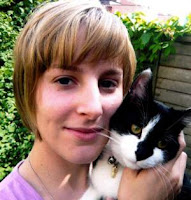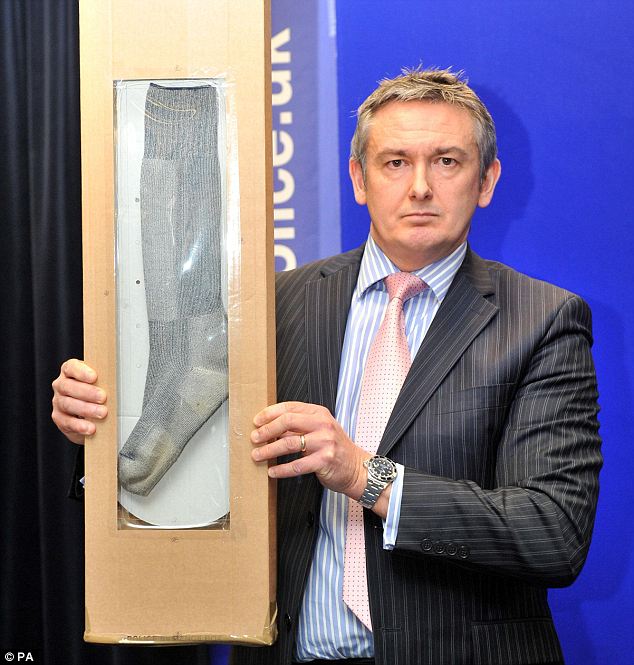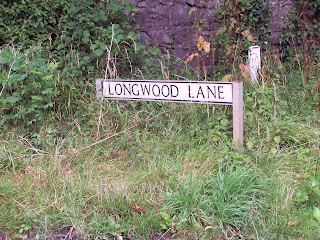Here’s why we can
be so sure that Vincent Tabak was made a scapegoat who had nothing to do with the killing of Joanna Yeates –
 |
| Joanna Yeates |
(The evidence implicating Greg Reardon is listed at the end of the post about her boyfriend. The evidence of a very high-level cover-up is listed at the end of the post about the police officers involved in the case.)
- The recommendation to arrest and charge Vincent Tabak with murder was made by Anne Reddrop, head of the CPS’s Complex Casework Unit, which exists to prosecute cases with multiple defendants and multiple victims. She must, therefore, have known from the outset that there were other implicated persons and that Joanna Yeates was not their only victim.
- Far from being found beneath the melting snow on the verge of Longwood Lane, as the public and the jury were told, Joanna’s body was deposited in an inaccessible and far less obvious place nearby, from which a very large operation by the fire and rescue service was needed for its recovery. The news media has not reported this. It suggests that the police knew the location and probably the identity of the perpetrator soon after she went missing.
- A coroner’s inquest was opened, adjourned and, after 3 months, concluded, without being reported in any of the news media. This can have happened only with the connivance of the news media.

No one in court at the Old
Bailey knew the defendant - The venue of the plea and case management hearing was moved at 24 hours’ notice from Bristol Crown Court to Court Two (which is normally used for terrorist trials) at the Old Bailey, London, so that there was no one in court who knew the defendant. Only those who had been specially tipped off were in the public gallery. This made it possible for someone else resembling the defendant, e.g., an actor, to enter the guilty-of-manslaughter plea via video-link, without the news media’s being aware of the deception. The hearing was also used as an off-the-record briefing to the news media about so-called “bad character evidence”.
- No motive for the alleged struggle, for inflicting Joanna’s 43 injuries, nor for killing her, ever emerged, nor were detectives looking for a motive when they made him a suspect. In his 1½ day opening speech, Nigel Lickley QC did not once explain what motive the prosecution believed the defendant had for attacking and killing Joanna.
- No one in court ever disputed that Vincent Tabak did not know Joanna Yeates personally nor even by sight.
- A cold, calculating, intelligent killer, as Vincent Tabak was depicted to be by the prosecution, would not be so foolish as to choose to kill a close neighbour whom he did not know without first securing a false alibi.
His well-paid job at Buro Happold was
a strong incentive not to murder anyone - The five years invested in researching his recent Ph.D and the £35,000-a-year job at Buro Happold that followed it gave him a very strong incentive not to take a chance on murdering anyone. Everyone who believes that education benefits society as well as the individual, and especially those who have earned their living by teaching, such as Christopher Jefferies, has a clear moral obligation to acknowledge this investment by requiring prosecutors in a murder case to demonstrate publicly a commensurably stronger motive than for an uneducated defendant.
- Regular visits from family and close friends are one of the few things that makes life in prison less unbearable. The severity of the punishment is therefore greatly aggravated when the sentence is being served in a foreign country other than your own, where visits from family or friends are likely to be very infrequent. The suffering and expense inflicted on the family is also greater. An intelligent, systematic, law-abiding foreigner like Vincent Tabak would have realised this beforehand, and weighed it against the benefit he expected to gain by killing Joanna.
- No credible reason ever emerged why detectives made him a suspect in the first place instead of any one of a large number of other men who had or might have had the same opportunity to commit the crime plus histories of criminal or violent behaviour especially towards women.
- Nothing about his previously known irreproachable character indicated a potential murderer or even a violent or
temperamental personality. Everyone who regards murder as a very serious crime has a clear moral obligation to acknowledge the investment made in his own trustworthiness, honour and reputation by any defendant without previous convictions, by requiring the prosecution to demonstrate publicly a convincing explanation for why such a person should have decided to become a very serious criminal. No independent witnesses testified to Vincent Tabak’s exceptionally good character. Did the prosecution impose this as a condition for not being allowed to produce the so-called “bad character evidence”? Was this deal made on 5th May 2011 and subject to permanent reporting restrictions? Was Buro Happold party to this deal?

Screams were not heard by other persons
in the house - Screams were heard by witnesses at or only a few moments after the time Joanna would have reached home, so, if they were hers, then the attack would have had to be very sudden, inconsistent with the alleged state of disorder in the flat, and totally out of character for Vincent Tabak. The screams were not heard by either of the other persons in the house at the time, suggesting that the person who screamed was some way away from the house when she opened her mouth.
- Vincent Tabak was too shy of girls ever to have tried to kiss one after just a few moments’ acqaintance, as his own defence QC alleged he had done. The “enhanced statement” he signed with evident reluctance, describing how he made a pass at Joanna and killed her after she rejected him, was based on a theory by unnamed detectives that was published in The Mirror nine days before he was first questioned as a suspect and could have had no foundation in the pathology of the body.
- The cold-blooded murder of a stranger by a person with a Ph.D but no motive is absolutely without precedent. No one who has steadfastly obeyed the law all his life and invested heavily in a very high education and career turns into a violent criminal from one day to the next. Vincent Tabak’s profile is totally unlike that of any other stranger murderer, and would be sensationally and statistically unbelievable, if this had not been deliberately played down by the news media in favour of the phoney porn allegations.
- Almost
exactly the same objections can be raised against suspicion having fallen
on Christopher Jefferies MA, thereby reinforcing the evidence that detectives were intent on setting up a vulnerable scapegoat. Soon after her disappearance, the landlord told the police that he had seen and heard Joanna with one or two other people in front of the house, probably at a time that conflicted with what her boyfriend had stated in the first video appeal. After her body was found, police emphasised that Greg Reardon was not a suspect, and leaked a “garbled” version of what the landlord saw to Sky News. Next day the landlord was arrested on suspicion of murder, but released on police bail two days later, still under house arrest. Keeping him on bail for five weeks after Vincent Tabak had been charged with the same murder suggests that the police’s real intention in arresting him was to isolate Mr. Jefferies from the media and ensure that he never spilt the beans about what he knew about the identities of these persons and their relationship to Joanna.

A much better hiding place - A cold, calculating killer, as Vincent Tabak was depicted to be by the prosecution, who was not in any hurry, would have been be able to find a much better hiding place for the body than the spot where the jury and the public were told she had been deposited.
- The pathology of the body made it highly likely that the killer was known to the victim, that she was subject to domestic abuse, and that her death was not sex-related.
- The disposal of the body and the pizza but not the victim’s mobile telephone, wallet, bag, coat and boats would have been illogical for Vincent Tabak, but much more readily explicable in the case of a killer other than him.
- The disappearance of the one sock would be inexplicable if Vincent Tabak had killed her in the flat, but easy to explain in the case of a jealous partner who strangled Joanna before she had had time to finish dressing, after finding her in bed with a lover or a client.
- The reason why Joanna’s body became frozen to the ground may have been because she had wetted her pants while she was being strangled. If this happened just as she arrived home, she would have had no opportunity to use a toilet since leaving the pub 50 minutes earlier. Had she reached home after being outside in cold weather all that time, she would have relieved herself straightaway, before starting to bake as the Vincent Tabak scenario required, and her bladder would have been empty when she was strangled.
- There
is one other suspect who stands out way above all other possible
suspects on the grounds of his relationship to the victim and an
astonishing amount of evidence against him.

A killer would have remained
in the Netherlands - After the interview with the Detective Constable at Schiphol had alerted Vincent Tabak to the fact that he had become a suspect, a killer would have remained in the Netherlands in the hope of resisting extradition, whereas an innocent man would have felt confident that he would quickly be cleared of suspicion if he returned to the UK.
- On 10th/11th January 2011, ten days before Vincent Tabak’s arrest and interrogation, The Mirror reported unnamed detectives’ hare-brained theory that Joanna’s killer may have had a secret crush on her and flipped out when his advances were snubbed. As this astonishing invention could not possibly have been deduced from forensic evidence, it must have been intended to distract a gullible public from the much more likely motive, namely partner jealousy. It was almost identical to the bizarre scenario in the “enhanced” statement that Vincent Tabak’s lawyers got him to sign 9 months later, proving conclusively that the defence were colluding with the prosecution.
- The
“enhancement” of partial DNA from the body after Vincent Tabak
had become a suspect was self-fulfilling. It formed the basis for his
arrest, but he disputed its validity at that time, asserting that the forensic scientist who had analysed it must have leaked it to the media in return for financial gain. It
was his word against hers, as the samples were used up in the enhancement
process. If the DNA had matched Vincent Tabak’s then it could not have matched the landlord’s DNA, so the arrest of Christopher Jefferies proves that the evidence of DNA on Joanna’s breast was a fake.

Minute forensic samples in the boot of the car
would not have stood up to questioning in court - The minute forensic samples linked to the victim found in the boot of the car used by Vincent Tabak are open to similar objections. The scientist who testified to these subsequently remarked in a newspaper interview that her evidence was not questioned in court by the defence because of the accused’s manslaughter plea. As the prosecution had secured this plea by means of a confidence trick perpetrated by an imposter, her DNA evidence would not have withstood a challenge in court. This material could have found its way into the car boot by the agency of the claws of the victim’s cat.
- The absence of drag marks on Joanna’s body or her clothing, reported in
The Mail on 22nd January 2011, is consistent with her having been strangled in the killer’s car, where she was already seated, or close to the road where her body could easily be loaded into the car. To convict Vincent Tabak, the police had to postulate his use of a large cycle bag to move her body from her flat to the boot of the car he was using.
The black coat he was seen wearing in Asda.
The video has been edited to render unreadable
the time display at the lower left-hand corner. - Tabak was accused of visiting the Asda supermarket, with Joanna's body in the boot of his car. In the CCTV of him doing his shopping, his demeanour looks perfectly normal. A first-time murderer would have looked at best edgy, at worst terrified. Some serial killers might go around with a body in a car, but not Vincent Tabak.
- Despite the agreement by both the prosecution and the defence that Joanna Yeates was murdered in her flat, no expert witness testified to any of the results of the protracted forensic investigation at 44 Canynge Road. The jury would certainly have been told about it if any blood from Joanna or any DNA from Vincent Tabak had been found in her flat – even though he surely would have leant on the kitchen worktop? Her nose got broken, and bled, probably causing a spray of blood, sending droplets a fair distance. However the court was told nothing about whether any trace of her DNA was found on his glasses, or on the black coat he was seen wearing in Asda, or on any of his other clothes, or in the parts of the car which would have been in contact with his outdoor clothes after he had dumped the body.

The scientist told the jury nothing about
the forensic examination of 44 Canynge Road - Two days before the defendant went into the witness box, Counsel for the Defence cross-examined the forensic scientist who had testified to the traces of partial DNA on Joanna’s bloodied body and specks of her blood in the boot of the car, but he did not ask this witness about the forensic results obtained from 44 Canynge Road, not did she even mention the very prolonged search at the house. The body had been found with blood on the hair, face, T-shirt and sock, by a stone wall which also had a smear of Joanna’s blood on it. Mr. Clegg knew very well that his client would be telling the court that he had placed the lifeless body on her own bed, then on the ground outside, halfway between her flat and his, then in the hallway to his flat, and then in his spare room, before putting it into a bicycle bag and into the car boot. Counsel never said anything that might arouse the jury’s curiosity about why the exposed body had left no traces of blood nor DNA at any of these numerous places where it was laid down, even though the DNA expert had told them that blood from the body had leaked through the bicycle bag onto the floor of the car boot.
The jury was deceived about the defendant’s
Google researches - Vincent
Tabak’s alleged Longwood Lane Google and other similar computer searches
are open to the objection that any killer of much lower intelligence and
with much less technical expertise than Vincent Tabak would have taken
care to avoid leaving an incriminating trail by conducting them on
computers not associated with him. Their timings were misrepresented in court by an ingenious but deceitful collaboration between Counsel for the Prosecution and the police’s so-called IT expert, so they have no validity as evidence of guilt.

The prison chaplain faked the confession
in collaboration with Counsel for the Defence - Because of his manslaughter plea and
the chaplain’s testimony in court, Vincent Tabak is considered to have
“confessed” to the killing. However the chaplain can be shown to have faked the confession in collaboration with Counsel for the Defence, and the plea was rendered unsound by the use of a video-link and the absence from court of anyone who knew the defendant. The validity of any confession is dependent
on the means used to obtain it and on the vulnerability of the person
confessing. Custody is a very severe form of coercion, which Christopher Jefferies has described as “a form of rape”. Any confession
obtained in custody is therefore inherently a confession obtained under
coercion. Torture, the threat of torture, and the use of that
threat to obtain a prisoner’s silence about his treatment, are additional
forms of coercion. Vincent Tabak was subject to several forms of torture
while on remand and the threat of torture is known to have been available.

A very high concentration of exceptionally
violent hardened criminals - It was reportedly for his own safety that
Vincent Tabak was remanded in custody in Worcestershire in Long Lartin.
As this prison has a very high concentration of Grade “A” inmates, who are
exceptionally violent hardened criminals, some of them serving life
sentences, it can be inferred that terror and the threat of violence and
intimidation was part of the prosecution’s means to coerce Vincent Tabak into acquiescing to the “show” trial. A
violent life prisoner has nothing to lose by inflicting grievous bodily
harm on another person. Confining a vulnerable prisoner “for his own
protection” only serves to increase his isolation, which is considered a
form of torture.

She was not allowed to visit
him in prison for three weeks - The Government’s rules for remand prisoners entitle them to three visits per week. Vincent Tabak’s first visit was three weeks after being arrested, when his girlfriend and his brother from Holland got permission to visit him. This occurred after his conversations with the chaplain, i.e., after his fake “confession”. Denying him visits from his girlfriend was a form of torture and prevented him from discussing his defence with those close to him.
- Vincent Tabak was represented by a
succession of two different solicitors from two different law
firms local to Bristol
and dependent on Avon & Somerset Constabulary for many of their other briefs, and three different barristers from two different chambers, all of them paid for out of public funds. The lawyers representing him were thereby protected against compromising themselves since they would not have been able to recognise the person on the video-link who entered the plea because they had not met the defendant. The CPS’s strategy was to maintain that the charge was murder so
that Vincent Tabak could be coerced into standing trial for the much milder sentence for
manslaughter. The unsound guilty plea obviated the need for the forensic evidence
against him to be tested in court. As the police and the CPS knew that
this evidence too was unsound, they could not allow the defendant himself to plead Not Guilty. It
may be inferred that the second solicitor Ian Kelcey was the first one the
police could find who was prepared to talk Vincent Tabak into signing the “enhanced” statement despite the faking of his confession and the weakness of the forensic evidence against him.

The second solicitor – Ian Kelcey - Since 2004 it has been stated Government policy to “persuade” remand prisoners to confess, so as to save the expense of a trial. This implies that a proportion of those who are persuaded to confess are likely to be innocent. It is also known that prisoners applying for parole are obliged to demonstrate remorse, which of course is unrealistic for those who have always maintained their innocence.
- A & S Constabulary and the CPS used a variety of manipulative techniques before and after the trial to brainwash the general public so as to distract them from the openly visible failure of the due process of law. The police apparently worked actively to alienate Vincent Tabak’s girlfriend, her family and his employer from him, and exploited the victim’s family to voice public hate-statements directed against Vincent Tabak and even against his family.
- Vincent Tabak’s solicitors failed repeatedly to ensure a succession of their client’s most fundamental rights due under the process of law.
- Counsel for the
Defence William Clegg QC pretended, sometimes with more subtlety than
at other times, to defend his client, while in reality supporting the
prosecution’s case in all sorts of ways. It was probably he who counselled
the Tabaks against using the media to win the public sympathy that would
otherwise have been readily forthcoming in view of their background and
his education and excellent character. Getting his client to sign the highly creative “enhanced statement”, and then putting him into the witness box for two gruelling days to be cross-examined on it, predictably delivered him into the Prosecution’s hands.

Defence Counsel William Clegg QC - The magistrate and the judges failed completely to perform their most important function as a bulwark against corruption and injustice. The trial judge Mr Justice Field was co-instigator of Vincent Tabak’s public humiliation after the “show trial” was over.
- The unprecedented revelations after the trial about the legal pornographic videos & prostitutes were gratuitously fabricated by anonymous police, as no officers prepared to testify under oath that Vincent Tabak had viewed any such videos or contact any such girls were ever named. Nor did these have any substance as evidence of bad character, reflecting the wishful thinking of the prosecution and the journalists. They were invented to form the basis of an unreported deal to ban all independent “good character evidence” from the defence’s case, to explain to a gullible public why someone of irreproachable character with no previous convictions nor history of violent nor unpredictable behaviour should suddenly commit a motiveless crime, to give the media a legally enforcible reward for never asking questions about the soundness of the verdict, and to conceal from the community the vulnerability of skilled migrant professional staff to corrupt local police officers.
- The allegations about illegal images of child abuse were demonstrably phoney, because the identity of the witness who allegedly found them on Vincent Tabak’s computer was never made public, and the police showed no interest in tracking down the victims and accomplices. Had these images existed at all, they would certainly have been put to the jury as irrefutable evidence of the defendant’s bad character, and he would have been prosecuted for possessing them straightaway.
- When Vincent Tabak was tried in 2014 for possession of illegal images of child abuse, he retained lawyers from the same two law firms to represent him. His failure to sack them suggests that he had no regrets about their disastrous strategy for his murder trial, which included two excruciating days in the witness box. The only consistent explanation for this curious behaviour is that he and his lawyers had agreed to serve up a guilty verdict in return for a secret amnesty and a new identity.
The charge of murder
 |
| DCI Phil Jones with a sock matching Joanna’s |
 |
| Crown Prosecutor Ann Reddrop Head of the Complex Casework Unit |
 |
| Paul Cook |
 |
| Joanna Yeates – her picture was shown prominently in the press |
 |
| Joanna Yeates’s boyfriend Greg Reardon |
 |
| Landlord Christopher Jefferies with his new identity |
What state would Vincent Tabak have been in by the time he reluctantly agreed to sign his “enhanced” statement eight months after his arrest?


